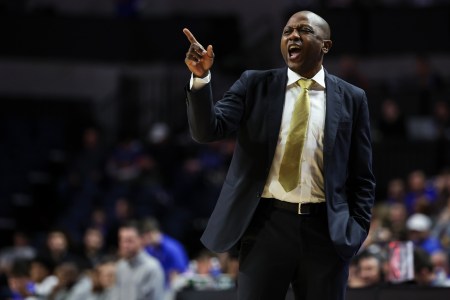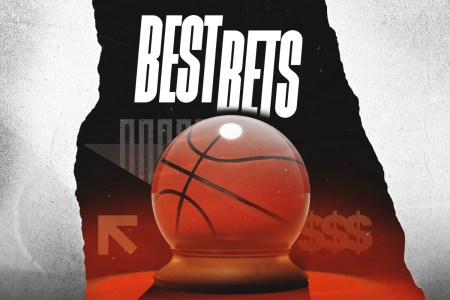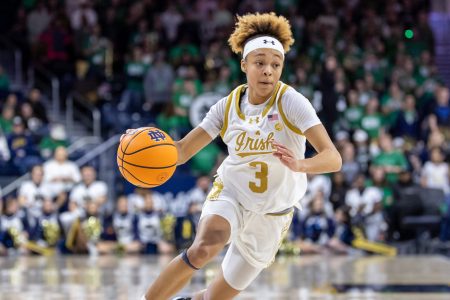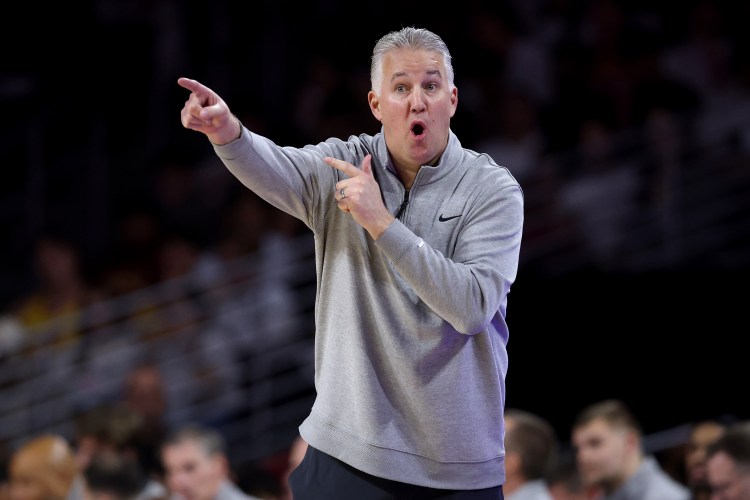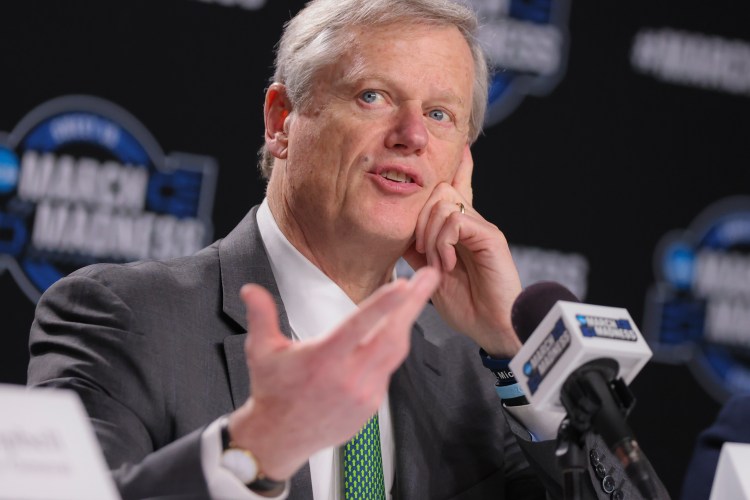“High Knees.”
You may not know his real name, but if you are a college basketball fan, you have seen him in action. If you’ve tuned into a big-time game, particularly a recent Final Four contest, you’ve seen Jeffrey Anderson in his zebra uniform running the sidelines with his highly distinct running posture: high knees, back straight, head up. And always with his eyes on the action.
In a sports culture where officials are expected to be inconspicuous, never to be heard or seen unless they make a big call (or a really bad one), anything an official does that could bring attention to themselves opens them up to criticism. Anderson’s “high knees” have brought some seemingly fun attention his way, but it can be a thin line. The Twitter account dedicated to him — a fan account that videos his high knees in action game to game — has close to 20,000 followers. Within the industry, he is now often referred to simply as “High Knees.”
Anderson never expected to become famous for his running style, but he tries to see the humor in it. “Social media is social media, that’s where we are now,” he says. “You just worry sometimes. There are some ruthless people out here. They love their teams. But, it’s alright, I think it’s funny. I’ve heard people say, ‘He’s doing it for attention,’ I’ve heard all that, man. No, I’m not.”
Fans who know Anderson only as “High Knees” may not be aware he is also one of the elite referees in the sport. He has made seven straight Final Four appearances and is the Big Ten’s primary referee. Anderson is currently ranked No 3 in KenPom’s referee rankings. The rankings are fluid, as Anderson was ranked first just a few days ago, but he is clearly among the best — and most in demand — in his profession. “Probably one of the top five, top three officials in the country,” Big Ten Supervisor of Officials Terry Wymer says. “He brings instant credibility to the league and coaches love to see him on their games. He has done it the right way, starting out at the lower levels and working all the way up.”
It all started 29 years ago in Rochester, N.Y. His junior college and Division III basketball career years done, Anderson was still playing pickup basketball every day and started refereeing 18-to-20-year-olds in a city recreational league. His friend Jerome Davis, a high school basketball referee, watched Anderson in action and suggested he try his hand at officiating in high school. Anderson brushed off the suggestion, but a couple of years later, Davis reached out again. This time Anderson agreed and was immediately thrown to the wolves of Rochester high school basketball. He not only survived, but flourished pretty quickly and found a new love.
Anderson spent two years reffing freshman and junior varsity games before being promoted to varsity. His first year on varsity, he officiated 42 games, an unusually high number for a newbie. He was already in demand.
A friend convinced Anderson to attend a junior college referee camp where Big East official Mike Kitts was evaluating young prospects. Anderson made an impression and started working junior college games soon after the camp. The Big East then invited him to work and be evaluated at Sonny Vaccaro’s legendary ABCD youth basketball camp, which featured the nation’s best high school players, including Kobe Bryant, Carmelo Anthony and LeBron James. Anderson gained valuable experience and while he did not get the call from the Big East he was hoping for, he soon started officiating Division III games in the Rochester area.
In 2002, Anderson secured his first Division I contract with the MAAC. From there came other mid-major conference games and in 2008 he worked his first NCAA Tournament. He worked the tournament again the next season, then the NIT and then he got his big break, the call from the Big East he had been waiting for. He went on to ref for the Big East, ACC and Big Ten, worked deep into the NCAA Tournament and eventually did the first of his seven Final Fours in 2017.
Anderson grew up playing basketball everywhere he could, including on concrete playgrounds (back when kids did that sort of thing). He also ran track as a youngster. That along with his early refereeing career — running up and down the basketball court — caught up with him. He developed herniated disks in his lower back. About 12 years ago, he started seeing a chiropractor who suggested that in order to help ease the pressure on his back and knees and to prolong his career as an official, he should try a new style of running. He suggested that Anderson start running with his back erect and his knees as high as possible. It was awkward at first, but in time he got used to it and felt positive results.
He never expected, of course, to gain such notoriety for this quirk, but it is worth it to keep his body — and back — in shape. “A lot of people think I was doing it for show or whatever,” Anderson says. “I didn’t come up with this. Somebody was actually trying to help me.” He took satisfaction at the Big Ten meeting early this season when the league brought in an expert to show referees how to run and move around the court. “First thing he shows is how you should be moving your feet, up and down, high,” Anderson says. “And so I just looked around the room. I said ‘mm-hmm, uh-huh.’ But what it does is it takes pressure off the knees, for one, and pressure off the back… It actually works, it really works, man.”
While the public is focused on Anderson’s quirky running style, he is focused on becoming a better ref. He believes the same thing that makes a player elite makes a referee great as well. “They have a feel [for the game] and they’re not afraid at the end of the game,” he says. “They want it in their wheelhouse. They want the play coming right at them. They want to say yay or nay on it. I want to be involved in the last play. Some of the best calls are no-calls, but you want to be there. I want them coming right at me.”
Anderson has become respected as much for his personality and patience as his ability to make accurate calls. “His communication skill is over the top,” Wymer says. “He communicates with players and coaches very well. His willingness to admit that he made a mistake is something that a lot of guys can’t own up to. He doesn’t make many, but when he does he communicates with [the coach] and says, ‘That was on me.’ They accept that.”
Which is not to say Anderson isn’t willing to draw a line when he needs to. He is not known for being quick to call technical fouls, but this season he has ejected UCLA coach Mick Cronin and Northwestern coach Chris Collins for arguing too vociferously. “No matter what, I want my respect, because I’m gonna give you yours,” Anderson says. “When you come at me and it’s not with respect, I’m the guy that’s going to tell you what you can’t do anymore to me and tell you if you do it again it’s a technical foul. So, I’ve learned to put it in their hands… I don’t want to be embarrassed and I’m never trying to embarrass you.”
When it comes to players, Anderson’s philosophy is a little different. “My fuse is probably a little shorter with the players, because it’s a respect thing,” he said. “I’m an adult, I’m not the 18- to 25-year-old person.” Wymer also points to Anderson’s character and value as a mentor as perhaps his biggest strengths. “He’s just a good human being,” Wymer says. “He’d do anything for anybody at any time. In basketball, we need mentorship and not everyone is willing to give back like he is.”
Anderson is also mentoring his son, Joshua, who is himself an up-and-coming ref with a much more conventional running style. The two of them reffed a Colgate-Bucknell game together in January. It’s fun to imagine that the two of them might work a Final Four game together some day. That may sound like a crazy notion, but it’s no less unlikely than the story Anderson has written to this point. “It’s been a fast ride, man,” Anderson says. “It’s crazy. I tell everybody, if it ended tomorrow, I’m one of the happiest dudes in the world. To do what you love?”


